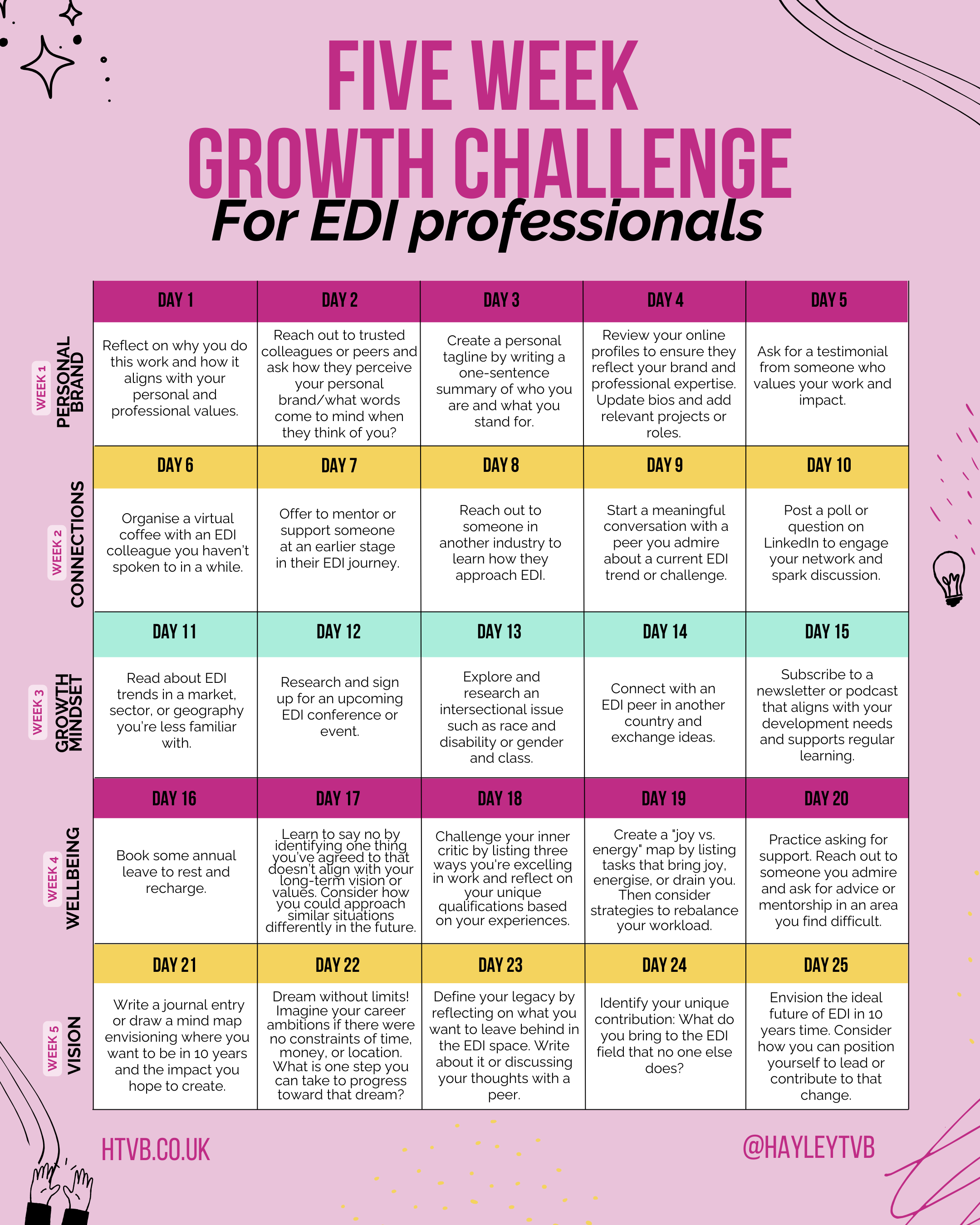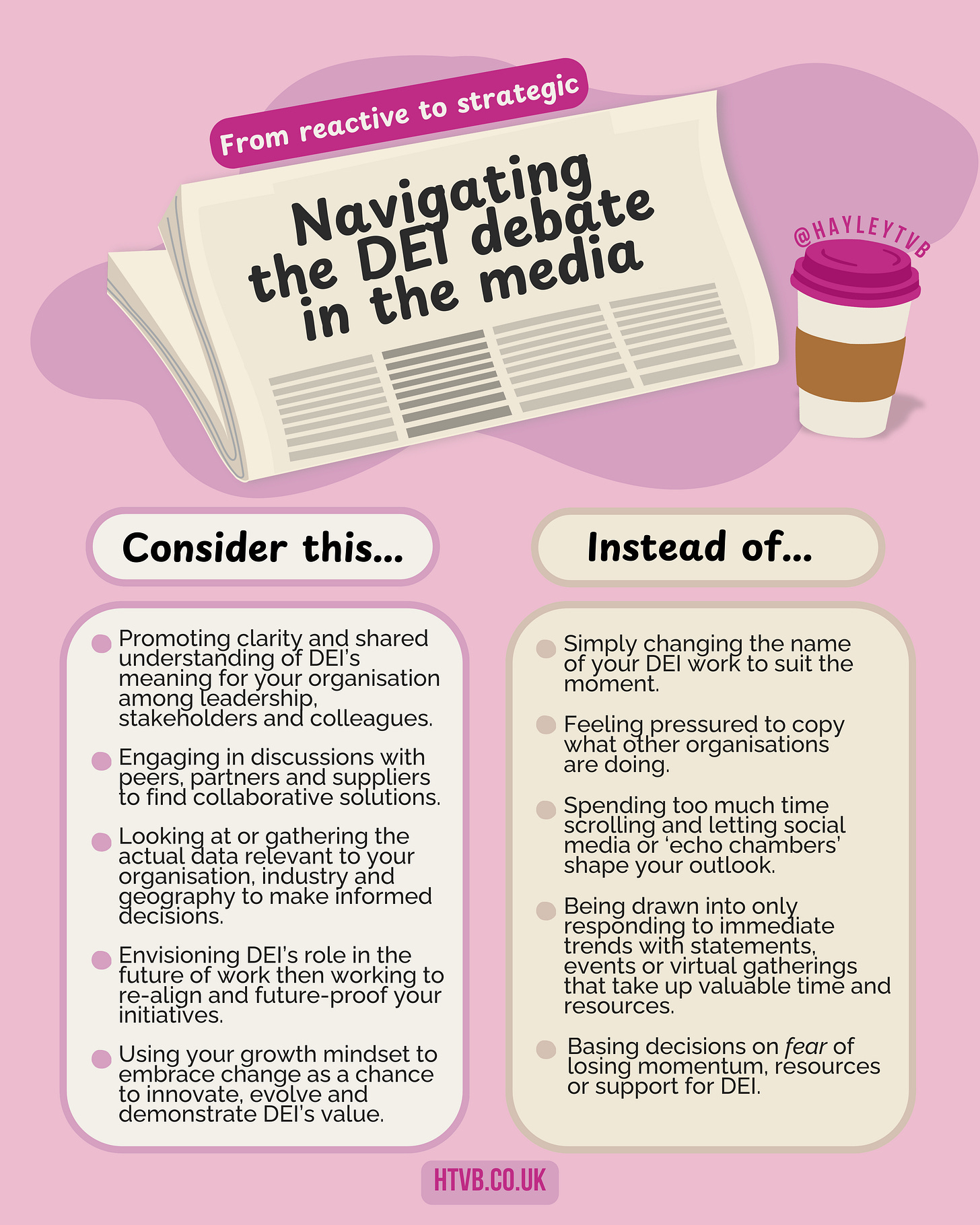Monthly DEI learnings with Hayley
Prioritising Growth, Community, and Wellbeing Amongst Uncertainty
Welcome to your first DEI Learnings of the year! ✨
We’re beginning 2025 in a climate of instability, concern and frustration 🫣.
In times like these, it’s more important than ever to prioritise our wellbeing, strengthen our communities and adopt a mindset that can help us navigate what we are experiencing. While the challenges may feel overwhelming, they also present an opportunity to innovate, collaborate and deepen our impact.
That’s why I’m starting the year by focusing on intentional steps to ground ourselves and lead with clarity and purpose.
I’ve created a 5-Week Growth Challenge designed to help us all build resilience, nurture our personal and professional growth, and lead with intention in the year ahead 👇🏽
As EDI advocates and professionals, we often prioritise others, leaving little room for our own growth and balance. These prompts will help us focus on:
Enhancing our personal brands.
Building connection and community.
Cultivating a growth mindset.
Nurturing our wellbeing.
Aligning with our vision.
This challenge is all about making small, intentional steps to grow ourselves while continuing to make a meaningful impact. You don’t have to do it in 5 weeks, and you don’t have to do it all - I am not about rules! But let’s take this journey together and message me to tell me how you get on. Feel free to share this with your network.
With love and support,
Hayley 💘
Read & share the latest articles that have got me thinking 💭
📉 What Can You Do If Your Company Is Cutting DEI Programs?
As the media talks about how many DEI programs are being reduced, this article offers actionable steps for leaders to ensure underrepresented groups continue to feel supported.
🤝 Chief Scout Calls for Volunteering Leave
Did you know that Black people are the most likely to volunteer in the UK? This insightful piece explores how introducing volunteering leave could amplify social impact and recognise the contributions of underrepresented groups.
🏢 Continuing the Work of DEI, No Matter What Your Company Calls It
Even as the term “DEI” faces challenges, companies remain focused on building inclusive cultures. This article reminds us that the work transcends labels, it’s about focusing on the outcomes we are trying to achieve.
🌟 5 Unconventional Ways To Demonstrate Inclusive Leadership
Inclusive leadership doesn’t have to mean grand gestures. Practices like sharing your story, hosting walk-and-talks and simply asking people what they need can make a meaningful difference.
🖤 Why We Need to Do Better on Bereavement
Steph Edusei highlights how bereavement policies often exclude extended family—a significant oversight for many cultures. As new legislation looms in the UK, this article is a timely reminder of the need for policies that truly reflect diverse lived experiences.
👀My new content
From reactive ➡️ proactive
I recently shared a post on LinkedIn about staying strategic during the ongoing DEI debates in the media.
Concept alert 🚨
Unconditional Positive Regard, a term coined by Carl Rogers, is a foundational concept in psychology, particularly in therapeutic settings. It refers to accepting and valuing someone without judgment, regardless of their actions, beliefs, or feelings. Therapists use this concept to create a safe, non-judgmental environment where clients feel supported enough to explore their thoughts and emotions openly. Some DEI practitioners are using the concept, or its principles, in educational or coaching environments.
UPR in DEI work is most effective when paired with:
Clear boundaries: Ensure expectations for respect and avoiding harm are established and upheld.
Accountability: While accepting people, we must hold them accountable for behaviors that conflict with DEI principles.
Empathy with action: Understand where someone is coming from, but also guide them toward less harmful practices or perspectives.
🧰 Resources for your Toolbox
Guide: Neurodiversity at Work
This guide from BITC is a foundational resource for creating a neuro-inclusive workplace. It covers:
How to discuss neurodiversity effectively.
Building inclusive recruitment processes.
Embedding neurodiversity into workplace culture.
Report: The Evolution of Work
This report is packed with insights into today’s workplace trends:
Flexibility and autonomy are now top job priorities.
DEI remains a priority for attracting younger generations.
Mental health support is expected, not optional.
A strong Employee Value Proposition aligns your culture with employee aspirations.














I'm always amazed by all your high-quality and well-crafted content, Hayley! 🤯